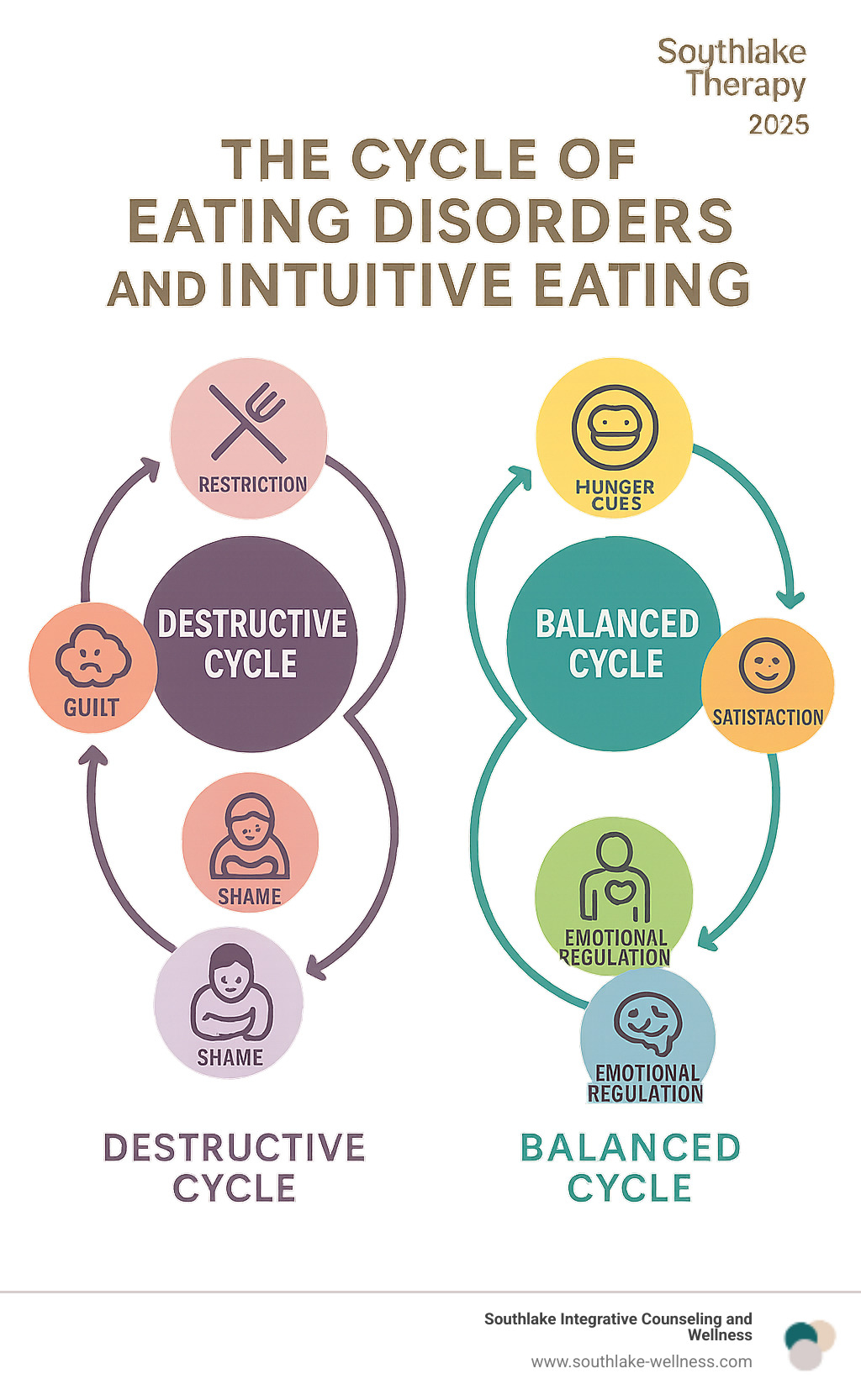
Why Early Intervention in Eating Disorders Can Save Lives
Eating disorder therapy southlake is more critical than ever, with over 2.5 million people in Texas struggling with these life-threatening conditions. Unfortunately, only a fraction seek the help they need.
Quick Guide to Eating Disorder Therapy in Southlake:
- Specialized therapists trained in CBT, DBT, and Family-Based Therapy
- Holistic approach combining mental health with nutritional counseling
- Virtual and in-person options for flexible treatment
- Insurance accepted by most qualified providers
- Crisis support via the 988 Suicide & Crisis Lifeline
Eating disorders have the highest mortality rate of any mental illness, but there is hope. Research shows over 85% of patients who complete comprehensive treatment see a significant reduction in symptoms, with 77% also experiencing less anxiety and depression.
Diet culture, social media, and chronic dieting can spiral into dangerous behaviors. The good news is that recovery is possible and happening daily in communities like Southlake.
I'm Holly Gedwed, a Licensed Professional Counselor Associate with 14 years of clinical experience in trauma, addiction, and eating disorder therapy southlake. My approach combines evidence-based therapies like CBT and DBT with personalized treatment plans for each person's unique healing journey.

Way 1: Recognize the Warning Signs and Understand the Urgency
Recognizing the signs of an eating disorder is the first step toward recovery. These complex conditions are rooted in emotional, psychological, and biological factors. For Southlake residents, awareness can lead to timely and effective eating disorder therapy southlake.
The struggle often appears as behavioral symptoms, emotional distress, and severe physical consequences. Individuals may become obsessed with food and weight, engage in restrictive dieting, withdraw from social meals, or compulsively exercise. Internally, guilt, shame, and body dissatisfaction can dominate their thoughts.
The urgency for treatment is high. Conditions like Anorexia, Bulimia, Binge Eating Disorder, ARFID, and OSFED carry serious risks and often co-occur with anxiety, depression, OCD, and trauma. Acknowledging these symptoms is a courageous first step.
The Alarming Reality of Untreated Eating Disorders
Untreated eating disorders cause severe, life-threatening effects. The body endures significant damage, including cardiovascular problems like heart failure, bone density loss (osteoporosis), and gastrointestinal issues. For women, it can lead to infertility.
It's a sobering fact that eating disorders have the highest mortality rate of any mental illness. The longer they go unaddressed, the more entrenched the behaviors become, and the greater the physical and psychological toll. We address the underlying trauma that often fuels these conditions. You can learn more about our approach to deep-seated issues at Trauma Therapy Southlake.
Common Symptoms Southlake Residents Should Know
Identifying signs is crucial for early intervention. Key symptoms Southlake residents should know include:
- Obsession with food, weight, and calories: Constant thinking about food or extreme fear of certain foods.
- Frequent dieting or restriction: A cycle of restriction followed by overeating.
- Withdrawal from social meals: Avoiding food-related events due to anxiety.
- Compulsive exercise: Exercising excessively to "burn off" calories, despite fatigue or injury.
- Body checking: Frequent weighing, mirror checking, or measuring body parts.
- Guilt and shame around eating: Intense remorse after eating, especially "forbidden" foods.
- Mood changes: Increased irritability, anxiety, or depressive symptoms. Learn more about co-occurring Depressive Disorders.
- Misuse of diet pills, laxatives, or diuretics to control weight.
- Distorted body image: Perceiving oneself as larger than they are or intense body dissatisfaction.
Many symptoms are fueled by diet culture. Recognizing these signs is a courageous first step toward seeking specialized eating disorder therapy southlake.
Way 2: Explore Evidence-Based Eating Disorder Therapies
You don't have to recover from an eating disorder alone. Effective eating disorder therapy southlake requires a multidisciplinary team of professionals, including therapists, dietitians, and medical doctors, all working to support your healing.
Our approach honors the mind-body connection. Lasting recovery occurs when we address not just food-related behaviors but also deeper emotional patterns and physical needs. This holistic approach builds resilience and restores overall health.
Because every person's journey is unique, we create individualized treatment plans. For a deeper dive into our services, please visit More info about our Services.
The Role of Individual Psychotherapy
Individual therapy provides a safe space to explore the 'why' behind your eating disorder without judgment.
Cognitive Behavioral Therapy (CBT), particularly the improved version (CBT-E), is a powerful tool. It helps you identify and challenge distorted thoughts about food, weight, and self-worth, such as "I'm not good enough unless I'm thin." This process opens up new ways of thinking and acting. We also address root issues like perfectionism, low self-esteem, and emotional management.
Interpersonal Psychotherapy (IPT) focuses on improving your relationships. Since eating disorders can create social distance, IPT helps you develop healthier communication and coping skills, allowing you to reconnect with loved ones. To learn more, explore More info about Individual Therapy in Southlake, TX.
Specialized Modalities: DBT and FBT

Specialized approaches like Dialectical Behavior Therapy (DBT) and Family-Based Therapy (FBT) are also powerful.
Dialectical Behavior Therapy (DBT) is helpful for those who struggle with intense emotions. It teaches practical skills in four key areas: mindfulness, emotional regulation, distress tolerance, and interpersonal effectiveness. These skills help you manage feelings and crisis moments without resorting to eating disorder behaviors.
Family-Based Therapy (FBT) is highly effective for adolescents and recognizes that eating disorders impact the whole family. FBT empowers parents and family members to become active partners in recovery. Families learn to support structured meals and work together as a team, using love and support to create healing.
The Importance of Nutritional Counseling
Effective recovery often involves unlearning restrictive food rules. Our registered dietitians use a non-diet, weight-inclusive philosophy, focusing on nourishment rather than weight manipulation. The goal is to develop intuitive eating skills and learn to trust your body's hunger and fullness signals again.
This process involves debunking diet myths (e.g., "carbs are bad") that fuel eating disorders. Your dietitian guides you in healing your relationship with food, making eating a peaceful experience. They help you integrate all foods without guilt and address physical consequences of disordered eating.
This collaborative approach ensures your mind and body heal together, promoting joyful movement and peaceful eating.
Way 3: Find Qualified Eating Disorder Therapy Southlake
Finding the right eating disorder therapy southlake specialist is a crucial step. The rapport you have with your therapist is vital, as you need to feel understood and accepted. During initial consultations, trust your instincts and ask questions about their experience, credentials (like CEDS - Certified Eating Disorder Specialist), and treatment philosophy.
Ensure their approach aligns with your goals. Do they believe in full recovery and understand that healing isn't linear? A good therapist will create a non-judgmental space for honesty and growth. For details on our team, visit More info about our team of Therapists in Southlake, TX.
What to Look for in Eating Disorder Therapy Southlake
When seeking eating disorder therapy southlake, look for these key factors:
- Specialized experience: Your therapist needs specific training in treating eating disorders like Anorexia, Bulimia, Binge Eating Disorder, and ARFID.
- A holistic and integrative approach: The best providers combine evidence-based therapies (CBT, DBT) with approaches that address trauma and family dynamics for whole-person healing.
- Collaboration with other providers: Your therapist should work with doctors, psychiatrists, and dietitians to ensure integrated care.
- A safe and non-judgmental environment: Recovery requires vulnerability, so you need a space where you feel met with compassion, not criticism.
- A personalized care plan: Effective treatment must be adapted to your unique needs, as cookie-cutter approaches don't work.
Local and National Resources for Southlake Residents
You don't have to steer this journey alone. Several resources can support you:
- The National Eating Disorders Association (NEDA) offers a helpline, screening tools, and educational materials.
- For immediate help, If you are in crisis, please call or text the 988 Suicide & Crisis Lifeline. Trained counselors can provide support for eating disorder emergencies.
- For broader community support, explore More info about Southlake Mental Health resources.
Seeking help is a sign of strength. The right eating disorder therapy southlake specialist is ready to guide you toward healing.
Way 4: Accept Supportive and Modern Treatment Options
Embracing the full spectrum of support, from technology to loved ones, can make a significant difference in your recovery. Modern treatment options make eating disorder therapy southlake more accessible and comfortable than ever before, removing barriers and creating pathways to healing.
The Benefits of Virtual and Online Therapy

Virtual eating disorder therapy southlake is a game-changer for busy lives. It offers several key benefits:
- Improved Accessibility: Virtual therapy eliminates geographical barriers, allowing Southlake residents to connect with specialists across Texas from the comfort of home.
- Convenience and Flexibility: Schedule sessions around your work, school, or family commitments without the hassle of travel.
- Real-World Environment Treatment: Learning to manage triggers in your own environment can lead to more lasting recovery.
- Seamless Continuity of Care: Maintain consistency with your care team even if you travel, go to college, or move within Texas.
- Reduced Barriers to Entry: For those intimidated by in-person therapy, online sessions offer a less overwhelming way to take the first step.
Virtual treatment allows clients to receive comprehensive care from a full multidisciplinary team from the safety of their homes.
How Loved Ones Can Provide Meaningful Support
If you care about someone with an eating disorder, your support is powerful. Here's how to help:
- Educate yourself: Understand the complexity of eating disorders to approach your loved one with empathy, not judgment.
- Use supportive language: Express concern for their well-being ("I'm worried about you") rather than commenting on their food or weight, which can be triggering.
- Encourage professional help: Gently offer to help them find eating disorder therapy southlake or make appointments.
- Get involved in treatment: Family support is beneficial at any age. Group therapy also provides powerful peer support. Learn more at More info about Group Therapy Southlake.
Caring for someone with an eating disorder is challenging. In Texas, caregivers provide an average of six weeks of unpaid care annually, a $2.1 billion economic impact. This validates the significant burden on families. Seeking help creates a healthier environment for everyone.
Way 5: Steer the Practical Steps to Recovery
The healing journey becomes manageable when broken into smaller steps. Taking the first step toward eating disorder therapy southlake is a courageous investment in your future.
Concerns about cost or whether you're 'sick enough' are normal. Overcoming these barriers opens the door to a life free from guilt and full of joy. Eating disorders affect entire families, as shown by the $2.1 billion in lost productivity from caregiver burden in Texas. With proper treatment, families can thrive.
Understanding Insurance and Payment Options
Navigating insurance can be complex, but don't let it deter you from seeking eating disorder therapy southlake.
Most health plans cover mental health services due to parity laws, but details vary. When you call your insurer, ask specifically about coverage for "eating disorder therapy," "psychotherapy," and "nutritional counseling."
Understanding in-network vs. out-of-network benefits, deductibles, and co-pays can save you money. If coverage is limited, many providers offer sliding scale fees.
Therapy is an investment. The long-term medical costs of an untreated eating disorder are far greater than the cost of treatment now. Getting help is the financially smart choice.
Overcoming the "Am I Sick Enough?" Barrier
The thought, "Am I sick enough for therapy?" is a common barrier that prevents people from getting help when it's most effective. This is often the eating disorder's voice trying to convince you that you don't deserve help. These thoughts are symptoms, not facts.
Early intervention is powerful. Recovery is faster and less complicated when patterns are addressed early. The best way to know if therapy can help is to seek a professional assessment. A specialist can listen without judgment and provide information.
Reaching out for help is a sign of incredible strength. It takes courage to acknowledge you're struggling and take steps to change. We honor the whole person, addressing the underlying emotions and life experiences that contribute to the struggle. Learn more about our holistic approach and how we create personalized plans for your journey.
Frequently Asked Questions about Eating Disorder Treatment
When you're considering eating disorder therapy southlake, it's natural to have questions. These are some of the most common concerns we hear.
How long does therapy for eating disorders last?
Recovery is a process, not a quick fix. There is no set timeline for eating disorder therapy southlake provides. The length of treatment depends on factors like how long you've struggled, the type of eating disorder, and any co-occurring mental health conditions like anxiety or trauma.
Our focus is on long-term, sustainable healing. We work to build new neural pathways and change ingrained thought patterns. Relapse prevention planning is a key part of our work, and ongoing support through check-ins or group therapy is often beneficial.
What is the difference between a therapist and a dietitian in treatment?
A therapist and a dietitian are distinct but collaborative partners in your recovery.
Your therapist addresses the psychological roots of the eating disorder. They help you explore the emotions behind your behaviors, work on emotional regulation, process trauma, and heal your body image using therapies like CBT and DBT.
The dietitian focuses on nutritional rehabilitation and rebuilding a peaceful relationship with food. They work to restore healthy eating patterns and achieve medical stability from a non-diet, weight-inclusive perspective. They help you challenge food rules and learn to trust your body's signals again.
Together, they ensure both your mind and body are healing simultaneously.
Can I recover from an eating disorder?
Yes, full recovery is possible. Research confirms this: over 85% of patients who complete comprehensive treatment see a significant reduction in symptoms, and 77% experience decreased anxiety and depression.
Recovery requires commitment and professional support, but it is achievable. It means freedom from obsessive thoughts about food and your body, allowing you to reclaim joy, hobbies, and relationships. It's about developing a peaceful, nourishing relationship with food.
Your eating disorder may try to convince you otherwise, but that is the disorder talking. With the right team and evidence-based treatment, healing is not just possible—it's probable. We believe in your capacity to recover and will walk alongside you toward a fulfilling life.
Conclusion
Recovery from an eating disorder is happening every day in Southlake. By following these pathways, you can transform your relationship with food and your life.
- Recognize the warning signs to act early. Understanding the urgency—that eating disorders have the highest mortality rate of any mental illness—is key.
- Explore evidence-based therapies like CBT and DBT, combined with nutritional counseling, to build a foundation for lasting recovery.
- Find qualified *eating disorder therapy southlake specialists* who offer a safe, non-judgmental space for healing.
- Accept modern treatment options like virtual therapy and involve loved ones to build a strong support network.
- Take practical steps by navigating insurance and overcoming the "Am I sick enough?" barrier.
The healing journey is personal, but you don't have to walk it alone. At Southlake Integrative Counseling and Wellness, our holistic, mind-body approach addresses the whole person. Freedom from the mental chatter about food and weight is possible.
Take the first courageous step. We are ready to listen and walk alongside you toward the fulfilling life you deserve. Explore our comprehensive therapy services and start your healing journey today.